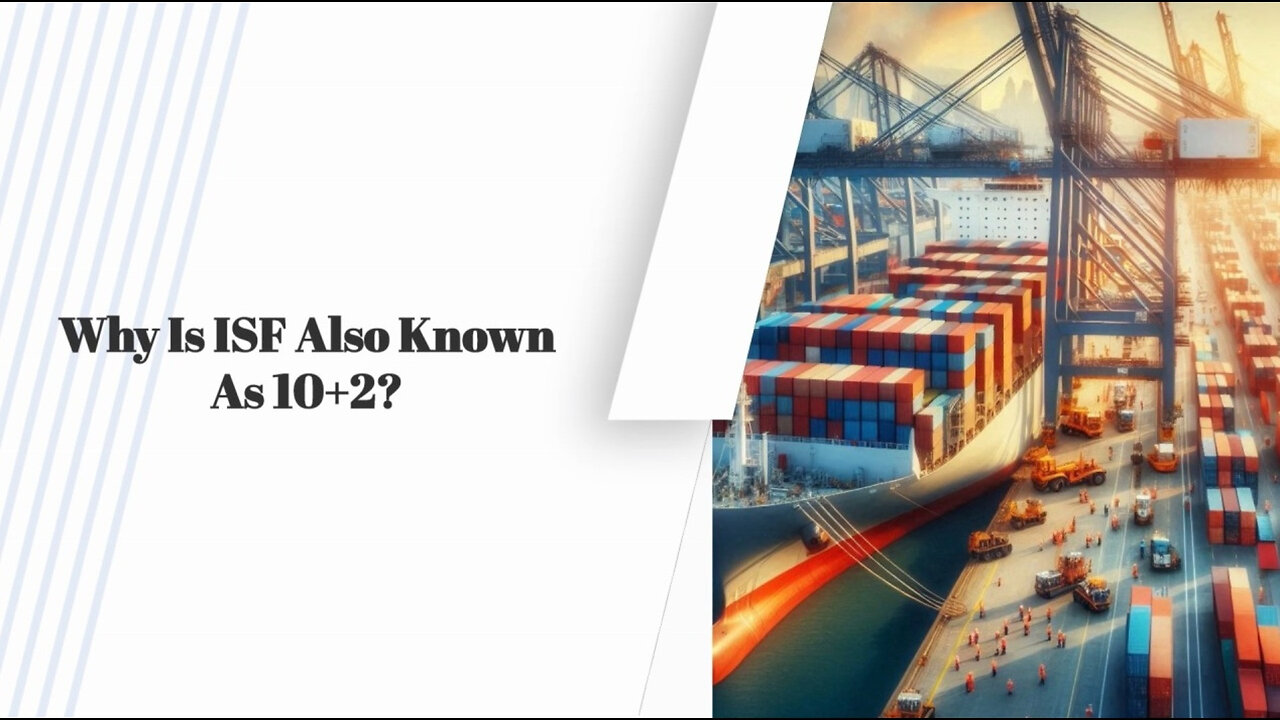Premium Only Content

Unlocking the Mystery: Why is Importer Security Filing called '102'?
ISF Cargo | Phone: 786-865-0459
Email: isf@isfcargo.com | https://isfcargo.com
The Importer Security Filing (ISF), also known as 102, is a mandatory filing requirement enforced by US Customs and Border Protection (CBP) for all ocean cargo shipments entering the United States. It is referred to as 102 because it falls under the 10+2 rule, which represents the ten data elements required from the importer and the two additional data elements needed from the carrier or shipping line. The purpose of the ISF is to enhance security measures and improve risk assessment by providing key information about the incoming cargo.
Compliance with the ISF is crucial in customs brokerage, as failing to meet the requirements can result in penalties and delays. Customs brokers, who are licensed professionals specializing in customs regulations and requirements, play a vital role in filing the ISF on behalf of importers. They ensure that all necessary data is accurately provided in a timely manner, allowing importers to focus on their core business activities.
Complying with the ISF offers several benefits. By filing the ISF correctly and on time, importers can avoid unnecessary delays in the supply chain. The ISF data helps CBP assess the risk level associated with each shipment, enabling them to allocate resources efficiently and prioritize cargo inspections, enhancing security and ensuring a smoother flow of goods. Additionally, compliance with the ISF can help importers build stronger relationships with supply chain partners, as it demonstrates their commitment to transparency and cooperation.
In conclusion, the ISF, also known as 102, is a crucial aspect of customs brokerage and international trade. It provides key information to CBP, enhances security measures, and ensures a seamless flow of goods. Importers can optimize their customs obligations by partnering with a knowledgeable customs broker, who can handle the intricacies of the ISF filing process.
#usimportbond #isfcustomsbroker #uscustomsclearing #isfentry
Video Disclaimer Here: This content is for educational use and not associated with any US government body.
00:44 - Overview of Importer Security Filing (ISF): ISF, mandated by U.S. Customs and Border Protection (CBP), is a filing requirement for ocean cargo shipments entering the U.S., aimed at enhancing security and risk assessment.
00:59 - Understanding '102': The term '102' refers to the 10+2 rule in CBP regulations, where '10' signifies the ten data elements required from importers, and '2' represents the additional data from carriers, creating a comprehensive information package for customs assessment.
01:49 - Role of Customs Brokers: Customs brokers are licensed professionals who assist importers in navigating customs regulations and ensuring compliance with ISF requirements, thereby preventing penalties and delays in customs clearance.
02:17 - Benefits of Complying with ISF: Timely and accurate ISF filing helps avoid supply chain delays, enhances security, improves relationships with supply chain partners, and fosters trust, potentially leading to better terms and conditions for importers.
-
 48:51
48:51
State of the Second Podcast
13 hours agoWhy Does Palmetto State Armory Keep Winning?
1.57K2 -
 32:01
32:01
SB Mowing
25 days agoHer Tears Said It All: “My Prayers Have Been Answered”
25.6K34 -
 3:28:55
3:28:55
Price of Reason
13 hours agoTrump Means Business! Disney's F4 Hail Mary Pass! Assassin's Creed Shadows Art Book SUCKS?
64.1K12 -
 8:00:07
8:00:07
SpartakusLIVE
11 hours ago#1 Shadow BANNED Hero
37.6K -
 2:17:46
2:17:46
Kim Iversen
12 hours agoTrump To SMUG Netanyahu: Let's Clear “All” Palestinians From Gaza! | RFK Jr, Tulsi Move On To Round Two
85.6K440 -
 30:25
30:25
Standpoint with Gabe Groisman
1 day agoDemocrats Are Stalling Trump Appointments with Senator Rick Scott
101K24 -
 1:00:24
1:00:24
The StoneZONE with Roger Stone
12 hours agoAnthony Fauci’s Brutal History Of Animal Torture Exposed! | The StoneZONE w/ Roger Stone
72.6K20 -
 1:03:38
1:03:38
Man in America
13 hours agoUSAID Corruption, $21 TRILLION Missing, & the End of the US Global Empire?
101K68 -
 56:38
56:38
Flyover Conservatives
13 hours ago6 Steps to Take Advantage of Trump’s New Golden Age! - Clay Clark | FOC Show
61.3K2 -
 1:15:25
1:15:25
Glenn Greenwald
13 hours agoTulsi and RFK Jr. Approved by Key Senate Committees; Trump Meets Netanyahu: Wants to Cleanse Gaza; Pro-Palestinian Group Suspended at UMich | SYSTEM UPDATE #402
118K107